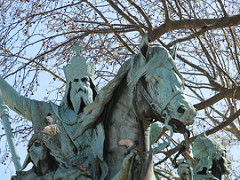
Last week, I mentioned a desire to have more dialogue about science and faith and do less monologuing. Toward that end, I’m going to try something new: a book discussion group via blog. I’ve posted a handful of book reviews in the past, but in general I don’t find them very satisfying. I’m not obligated to review books, so when I have it’s because I was excited or intrigued by the book and wanted to share it. But even if you read my review and are inspired to read the book, by the time you have a chance to do so the blog has “moved on” and it’s unlikely we will chat about the book. So this won’t be a book review, it will be a book read-along.
What I plan to do is read a book and post my thoughts as I go. My hope is that you will read the book too and share your thoughts, just like if we were in a book club or discussion group. I enjoy those groups in person. I don’t know if it will work as well via a blog, but that’s the exciting part about science, trying something new and not knowing in advance how it will turn out. At least once, I’d also like to try a livestream video chat about the book so we can have some face-to-face discussion as well. We’ll set that up in a couple of weeks once folks have had a chance to dig into the book a bit.
The book I choose is Shawn Otto’s The War on Science. While I’m not enthusiastic about the title as I don’t think everything needs to be framed in terms of conflict and war, I thought the contents would be relevant and of interest to a wider range of readers than a book on a specific science topic. Plus, as Christians we are called to be peacemakers so if there is a (perceived) war on science, we should be looking for ways to resolve the conflict. In that spirit, I don’t expect to agree with or endorse everything in the book. What I do expect is to engage in a dialogue with Shawn Otto and with you on the role of science in the public square. That may mean we add some nuance to the notion that science can reveal all truth or offer an alternative perspective on how religion and science can interact. That may mean we decide we should be standing alongside Otto as a voice for evidence-based policy on climate change or public health. Who knows? That’s why we do the experiment.
The book is likely to have a political focus, as Otto is also a co-founder of ScienceDebate.org, an organization promoting the inclusion of science topics in presidential debates. However, it is not a purely partisan book solely blaming conservatives and/or religious groups for obstructing science. It does cover religious responses to various science topics, but overall it aims for a more comprehensive look at public (dis)engagement with science that I think will be useful. Thus I think everyone will find something in the book where they agree with Otto or at least recognize some of the concerns he raises.

 )
)The book has 13 chapters. So that this experiment doesn’t drag on forever, my plan is to cover two chapters a week, starting next week. I’ll probably cover the last three chapters together for a total of six weeks of discussion. I’ll post my thoughts on the week’s chapters and I hope you will read along and offer your responses as well. I realize not everyone may be able to get a hold of the book by next week. Feel free to start when you can and comment on the relevant posts as you go, even if they went up a few weeks prior. If a good conversation starts up on an older post, I’ll direct everyone to it in a subsequent post so that we can all participate. (That goes for any previous post really. I keep an eye on the comments for all past posts, so feel free to chime in if you ever have something to say on a previous topic.)
As a warm up, here’s a quote from the foreword by Lawrence Krauss:
The scientific wisdom of the Greeks was largely abandoned in the Middle Ages.
That assertion has the flavor of an overly simplistic view of the Middle Ages leftover from when we called them the Dark Ages. Krauss needn’t have look farther than the Wikipedia page “European science in the Middle Ages” for a more nuanced historical perspective. I’m optimistic that writer and filmmaker Otto will embrace the humanities more than Krauss. Nevertheless, the quote is a good reminder to be on the look out for easy narratives (including my own).
Next week: chapters 1 & 2. And if anyone has experience with this kind of virtual book chat, please share any suggestions for making this a success.
Andy has worn many hats in his life. He knows this is a dreadfully clichéd notion, but since it is also literally true he uses it anyway. Among his current metaphorical hats: husband of one wife, father of two teenagers, reader of science fiction and science fact, enthusiast of contemporary symphonic music, and chief science officer. Previous metaphorical hats include: comp bio postdoc, molecular biology grad student, InterVarsity chapter president (that one came with a literal hat), music store clerk, house painter, and mosquito trapper. Among his more unique literal hats: British bobby, captain’s hats (of varying levels of authenticity) of several specific vessels, a deerstalker from 221B Baker St, and a railroad engineer’s cap. His monthly Science in Review is drawn from his weekly Science Corner posts — Wednesdays, 8am (Eastern) on the Emerging Scholars Network Blog. His book Faith across the Multiverse is available from Hendrickson.

Leave a Reply